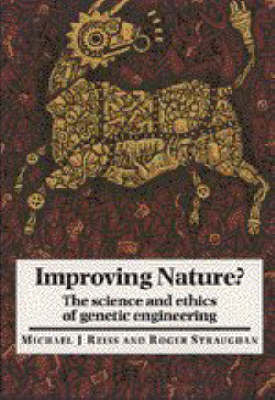
Improving Nature?
The Science and Ethics of Genetic Engineering
Seiten
1998
Cambridge University Press (Verlag)
978-0-521-63754-1 (ISBN)
Cambridge University Press (Verlag)
978-0-521-63754-1 (ISBN)
- Titel erscheint in neuer Auflage
- Artikel merken
Zu diesem Artikel existiert eine Nachauflage
A balanced and readable account of both the science and ethics of genetic engineering, written by a biologist and a moral philosopher. The book examines the production of new foods and medicines by genetic engineering and asks whether we should welcome such developments or fight against them.
Little more than a decade ago the term 'genetic engineering' was hardly known outside research laboratories. By now, though, its use is widespread. Those in favour of genetic engineering - and those against it - tell us that it has the potential to change our lives perhaps more than any other scientific or technological advance. But what are the likely consequences of genetic engineering? Is it ethically acceptable? Should we be trying to improve on nature? The authors, a biologist and a moral philosopher, examine the implications of genetic engineering in every aspect of our lives. The underlying science is explained in a way easily understood by a general reader, and the moral and ethical considerations that arise are fully discussed. Throughout, the authors clarify the issues involved so that readers can make up their own minds about these controversial issues.
Little more than a decade ago the term 'genetic engineering' was hardly known outside research laboratories. By now, though, its use is widespread. Those in favour of genetic engineering - and those against it - tell us that it has the potential to change our lives perhaps more than any other scientific or technological advance. But what are the likely consequences of genetic engineering? Is it ethically acceptable? Should we be trying to improve on nature? The authors, a biologist and a moral philosopher, examine the implications of genetic engineering in every aspect of our lives. The underlying science is explained in a way easily understood by a general reader, and the moral and ethical considerations that arise are fully discussed. Throughout, the authors clarify the issues involved so that readers can make up their own minds about these controversial issues.
Section A: 1. Introduction; 2. The practicalities of genetic engineering; 3. Moral and ethical concerns; 4. Theological concerns; Section B: Overview of section B; 5. The genetic engineering of microorganisms; 6. The genetic engineering of plants; 7. The genetic engineering of animals; 8. The genetic engineering of humans; Section C: 9. Public understanding of genetic engineering: what can education do?
| Erscheint lt. Verlag | 13.3.1998 |
|---|---|
| Zusatzinfo | 3 Halftones, unspecified; 21 Line drawings, unspecified |
| Verlagsort | Cambridge |
| Sprache | englisch |
| Maße | 154 x 228 mm |
| Gewicht | 485 g |
| Themenwelt | Sachbuch/Ratgeber ► Natur / Technik |
| Geisteswissenschaften ► Philosophie ► Ethik | |
| Technik ► Umwelttechnik / Biotechnologie | |
| ISBN-10 | 0-521-63754-6 / 0521637546 |
| ISBN-13 | 978-0-521-63754-1 / 9780521637541 |
| Zustand | Neuware |
| Haben Sie eine Frage zum Produkt? |
Mehr entdecken
aus dem Bereich
aus dem Bereich



